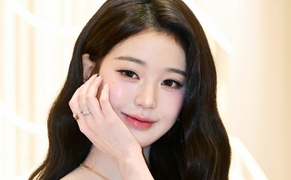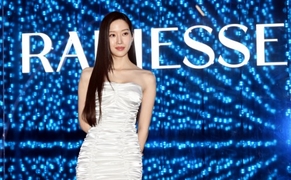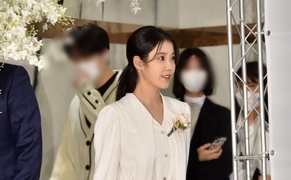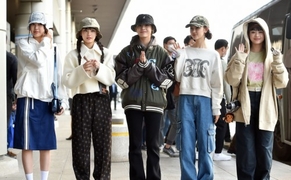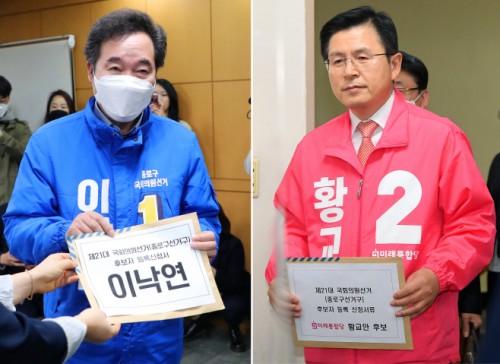 |
| Former Prime Minister Lee Nak-yon (left) of the ruling Democratic Party and Hwang Kyo-ahn, chief of the main opposition United Future Party, file their candidacies for the April 15 general election in Seoul’s Jongno Ward constituency at an election management office in the ward on March 26, 2020./ Source: Yonhap News |
By AsiaToday reporters Lim Yoo-jin & Woo Sung-min
The April 15 general election is only 19 days away. Candidacy registration for the election has ended on Friday. Registered candidates will be allowed to kick off full-pledged campaigning from April 2. This election will be highly influenced by voters in their 50s and 60s as well as centrists amid the novel coronavirus outbreak.
In the upcoming election, voters in their 50s are expected to play a pivotal role. The main characteristic of people in their 50s and 60s is that they prefer a candidate who will pursue practical policies, regardless of political inclination. Since these generations are mostly those who actually have to think about the economic part of their living after retirement, they put much emphasis on pledges and practicality over ideology. Experts pointed out that those in their 50s have become ideologically neutral since they are now more educated and critical-minded about social issues unlike before.
In the same context, centrist voters are expected to determine winners in the upcoming election. Those that are ideologically neutral and non-party loyalists are estimated to take up 30 percent of the total voters across the nation. Instead of casting all votes for a specific party, they tend to give support selectively depending on political situation.
“The most influential factor in centrists’ voting is their own interests, which directly leads to their livelihood and economic issues,” Shin Yul, a political science professor at Myongji University, said in a phone interview with AsiaToday. “One of the biggest issues regarding the people’s livelihood would be the supply of face masks amid the COVID-19 outbreak, and the economic issue would be soaring unemployment. How each party will approach to such public anxiety will influence centrist voters in the election.”
Some experts say the COVID-19 outbreak will work to the ruling Democratic Party’s advantage. During the early stage of the outbreak, however, it was regarded as an unfavorable factor for the ruling party. However, experts say more people would desire stabilization rather than judging the incumbent administration’s performance as the outbreak has become an epidemic. On the other hand, experts say that senior voters, who tend to be more conservative, could eschew casting ballots in fear of the risk of contagion in crowded polling places since they are known to be more vulnerable to the virus, making it unfavorable to the opposition.
“Coronavirus fears may lower turnout among senior voters,” said Yoon Hee-woong, a senior researcher at Opinion Live.
On the other hand, prof. Shin pointed out that there are many voters who criticize the government’s poor handling of the infection crisis and its self-praising attitude despite shortage of face masks. In the end, the upcoming general election scheduled for April 15 is expected to reveal the public assessment of the government’s handling of the coronavirus.
#general election #coronavirus #COVID-19 #April 15
Copyright by Asiatoday
Most Read
-
1
-
2
-
3
-
4
-
5
-
6
-
7

















